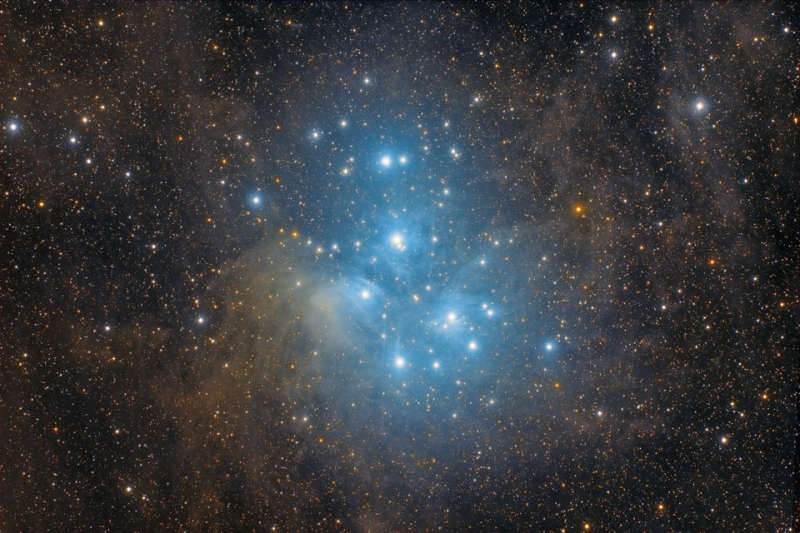Credit & Copyright: Roberto Colombari
Explanation:
Have you ever seen the Pleiades star cluster?
Even if you have, you probably have never seen it as dusty as this.
Perhaps the most famous star cluster on the sky, the bright stars of the
Pleiades
can be seen without binoculars from even the depths of a
light-polluted city.
With a long exposure from a dark location, though, the dust cloud surrounding the
Pleiades star
cluster becomes very evident.
The above exposure took about 30 hours and covers a sky area several times the size
of the full moon.
Also known as the Seven Sisters and
M45,
the Pleiades lies about 400 light years away toward the constellation of the
Bull
(Taurus).
A common legend
with a
modern twist is that one of the brighter
stars faded since the cluster was named, leaving only six stars visible to the unaided
eye.
The actual number of
Pleiades stars visible,
however, may be more or less than seven, depending on the
darkness of the surrounding sky and the
clarity of the observer's eyesight.
APOD Retrospective:
The Pleiades Star Cluster
1999 2000 2001 2002 2003 2004 2005 2006 2007 2008 2009 2010 2011 2012 2013 2014 2015 2016 2017 2018 2019 2020 2021 2022 2023 2024 2025 2026 |
Yanvar' Fevral' Mart Aprel' Mai Iyun' Iyul' Avgust Sentyabr' Oktyabr' Noyabr' Dekabr' |
NASA Web Site Statements, Warnings, and Disclaimers
NASA Official: Jay Norris. Specific rights apply.
A service of: LHEA at NASA / GSFC
& Michigan Tech. U.
|
Publikacii s klyuchevymi slovami:
pleiades - open cluster - Pleyady - Pylevaya tumannost'
Publikacii so slovami: pleiades - open cluster - Pleyady - Pylevaya tumannost' | |
Sm. takzhe:
Vse publikacii na tu zhe temu >> | |
